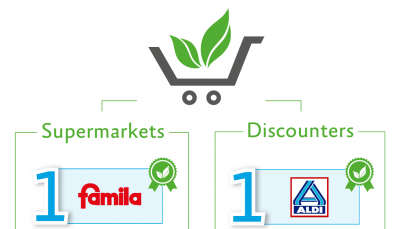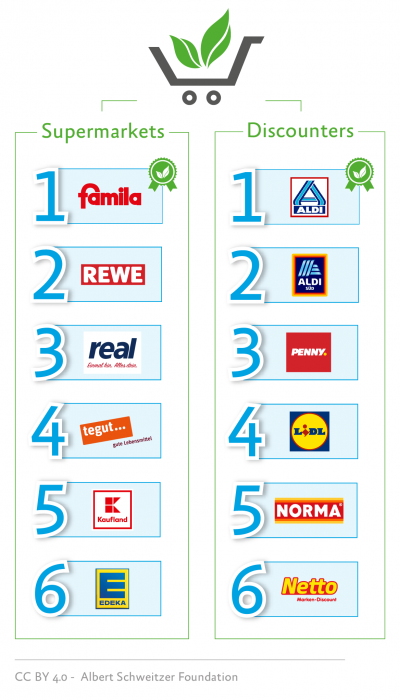

A wide range of vegan products is important – not only for people following a vegan lifestyle, but for everyone who wants to consume less animal products. To make it easier for consumers to find their way around, we have identified the most vegan-friendly supermarkets and discounters in Germany for the third time. We compared the large food retailers with respect to their vegan offerings and communication regarding vegan topics. The result: Famila Nordost and Rewe occupy the top positions among the full-range retailers, while Aldi Nord and Aldi Süd are convincing in the discount segment.
Positive Trend, but Room for Improvement
The evaluation of our survey initially shows a positive trend: Several companies are expanding their product range, testing new products and attracting customers through engaging communication. Compared to the previous ranking, we can see significant improvements in companies that are taking a strong approach to the vegan-topic. The continuous expansion of the vegan range is therefore paying off.
However, the ranking also shows that a good vegan offering is still not a certainty . The share of vegan assortments in food retailing is still small even though market researchers are forecasting rising sales figures for vegan products and numerous new vegan items are continuously being launched in Germany.
Differences Between Full-Range Retailers and Discounters
While supermarkets tend to create a range based on the product variety of their non-vegan assortments, discounters are currently still concentrating on basic products. However, we very much welcome the fact that many discounters are slowly but surely expanding their vegan offerings to ensure that vegan products are available in all price segments.
Conclusion: Stagnation is a Step Backwards
Companies that focus on the vegan-topic and constantly improve and expand their offerings can reach a broad target group. Not only vegans, but also vegetarians and above all the large group of flexitarians like to consume vegan products. Companies should not rest on their present product range: Stagnation in this area is definitely a step backwards and leads to them falling behind in the ranking.
We are currently working on internationalizing our vegan retail ranking. Our aim is to ensure that both companies in other countries and international chains can be compared across national borders.
The Ranking in Detail
Results of the Supermarkets
1: Famila Nordost
As in the previous ranking, Famila Nordost is clearly the leader among full-range retailers. The company not only convinces with the most vegan products overall, but also has the largest vegan product range in relation to the overall range and occupies the top places in all evaluation categories. In particular with the private label “Vegan Leben”(translating to Vegan Living), Famila positions its vegan offerings very clearly – both online and in stores – and communicates a positive image of the vegan diet with proactive advertisement.
2: Rewe
When it comes to the share of vegan products in the overall assortment, Rewe and Famila Nordost are on a par. Rewe has a solid assortment in all categories. However, as many of the stores are run privately, the range varies from market to market.
3: Real
With an outstanding range of vegan alternatives to milk and dairy products, very good labeling and an otherwise average plant-based range, Real secured third place.
4: Tegut
Tegut has lost two ranks compared to 2017. In contrast to its competitors, the company has not further expanded its plant-based product range in quantitative terms. Tegut is well behind the top 3 in terms of both the absolute number and the ratio to the overall product range. The company scores points with its very good range of vegetable meat, sausage and fish alternatives, the labeling of vegan products and its good online communication.
5: Kaufland
Kaufland has significantly reduced its vegan product range compared to the last ranking. Instead of an expected expansion of the product categories, various vegan articles were removed from the range. The existing labeling of their private label products is exemplary.
6: Edeka
As with Rewe, the selection of vegan products varies in the various Edeka markets. In large stores located in central areas you will often find a broad range of appealing vegan products. In other markets, however, you search in vain for a comparable range. In communication, existing opportunities, such as those opened up by the private vegan label, are not sufficiently exploited overall.
Results of the Discounters
1: Aldi Nord
Aldi Nord has improved in comparison to the last ranking: The company moved up from 3rd to 1st place. Despite the small overall product range, the discounter convinces with the largest share of vegan products and a solid vegan range. Another positive aspect is the labeling of beverages. The company has recognized that vegan labeling makes sense here, since hidden animal ingredients can be found in juice and wine, for example. With its marketing campaign »Die vegane Entdeckerwoche« (translating to The Vegan Explorers Week), Aldi Nord reached people both online and in the markets as well as in public places , encouraging them to buy plant-based products. This earned them additional points in the ranking.
2: Aldi Süd
The top-ranked company of the last ranking reaches second place this year. However, Aldi Süd is still the leader among discounters in the categories Ready-made and Semi-finished Vegetable Dishes and Vegetable Meat, Sausage and Fish Alternatives.
3: Penny
Penny is well ahead in the categories Sweets, Bakery Products and Snacks, Sauces and Dips and Spreads – this also applies to vegan staple foods. However, with its low score in the other categories and the small proportion of vegan products compared to the overall assortment, the company only achieved third place overall.
4: Lidl
Overall, Lidl does not have a large vegan range , but has consistently expanded it. The company has therefore improved by one rank compared to 2017.
5: Norma
Norma is ahead in offline communication – no other discounter advertises vegan products as consistently and regularly in its flyers. Norma’s labeling is also very good. Unfortunately, the company’s focus seems to be limited to these two aspects. Only vegan spreads have been topped up since the last ranking – the range in the other categories is stagnating or even declining. Even though we think communication and labeling are important: The actual vegan assortment should receive much more attention. Norma is therefore moving down two ranks.
6: Netto Marken-Discount
Overall, Netto is well behind its competitors. In all product categories surveyed, the company ranked at the bottom. Neither the communication nor the share of the vegan offerings in the overall assortment were able to gain points. The discounter has the greatest potential for improvement in all areas and has dropped from 2nd place in the last ranking to 6th place.
How was the Data Collected?
The data underlying the ranking were collected between October and November 2018. The companies were given spreadsheets in which they could enter information on their product range and list their communication material. We then reviewed, adjusted and evaluated the data.
What was Evaluated?
The survey is not based on the complete product range of the respective supermarket chains. Instead, only the following food groups were analyzed:
- plant based alternatives to meat, sausage and fish
- plant based alternatives to milk and dairy products
- plant based sweets, baked goods and snacks
- plant based ready meals
- plant based spreads and sweeteners
- plant based sauces and dips
- plant based staple foods
- vegan labeled drinks
These eight food groups were divided into 45 different product subgroups and weighted differently in the evaluation (alternative products were generally more important than products that are originally vegan). For the evaluation, we only considered products that are available in at least 80% of the stores.
The following aspects were also included in the evaluation:
- The labeling of vegan products
- The share of vegan products in the overall product range
- The communication material of the companies about vegan topics:
- online (e.g. on websites, in apps, in social media etc.)
- offline (e.g. in customer magazines, flyers and other print publications)
- in-store (promotion of vegan products right at the point of sale)